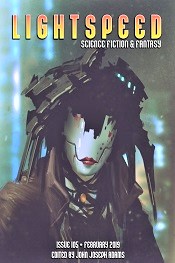 Lightspeed #105, February 2019
Lightspeed #105, February 2019
“Life Sentence” by Matthew Baker
Reviewed by Jeffrey Steven Abrams
“Life Sentence” by Matthew Baker
This thought-provoking tale looks at a possible revision to our criminal justice system. Rather than serving time for offenses, criminals having behaviors that precipitated the crime erased from their minds.
Washington is such a criminal. He remembers objects from his past, but his episodic memories, how he interacted with them, are gone. Returning to his family is a nightmare because, while he remembers his wife and children, he can’t remember any moments with them.
Reactions of Washington’s family to his change are particularly interesting. With memory stripped, he becomes a man they don’t know; certainly gentler, more thoughtful, but missing the element of aggression that made him who he was. When his acts of kindness cause his wife to break down, it’s clear that effects on family members were never considered when the punishment was introduced.
Late in the story, Washington meets a fellow “wiped” criminal who loses one year of memory for embezzlement. To receive a life sentence, Washington’s crime must have been horrendous, but the offense is never revealed. The fact that he’s willingly accepted back into his small Kansas community also struck me as odd. How eagerly would we accept Charles Manson or Jeffrey Dahmer?
“Ti-Jean’s Last Adventure, as Told to Raccoon” by KT Bryski
Such a title promises a frolicking, lighthearted adventure, and Ti-Jean delivers that and more.
Set in distinctly Canadian Toronto, the main character, an animal of some sort, has a story to tell but no one to tell it to. Raven is not home, Muskrat is doing Netflix, and Polar Bear is busy being endangered. Witty lines like this, sprinkled throughout the story, help lighten the mood as the plot darkens. There’s even a not-too-subtle poke at the United States for being overly helpful.
When the main character finds Raccoon, it launches into a delightful fable about how Ti-Jean cheats Death three times by making use of everyday items. The storytelling here is wonderful; witty, engaging, and often thoughtful.
For me, when the fable ends so does the story’s comprehensibility. The dialog between the main character and Raccoon becomes unnatural, with allusions to previously unmentioned events.
Baffled by the ending, I researched the character names and found many of them are from native-American legends. Ti-Jean himself is a character out of West Indies folklore. A reasonable knowledge of First Nation cultures is a must to get the most out of this story.
“The Terrible Oath” by Ashok K. Banker
Actually, part three of the “Legends of the Burnt Empire” series, this episode, with the exception of a couple of unexplained details, stands alone on its own.
Set in Arthaloka, a middle-Earthish kingdom, the story is an exploration of love, both the “I can’t live without you or I’ll die” kind of love, and the selfless love between a son and father.
The plot revolves around Sha’ant, king of the Empire, a man who is ready to retire but still young enough to enjoy life. With the kingdom in the capable hands of his son, Prince Vrath, Sha’ant ventures out on an expedition where he meets and falls hopelessly in love with a young ferrywoman. When King Sha’ant asks the woman’s father for permission to marry, he grants the request, with one caveat; their first son, rather than Vrath, must inherit the kingdom. The conundrum, which resolves emotionally, leads heartily toward the next installment.
Banker’s elegant writing style takes some getting used to. Forty-five-word or longer sentences aren’t uncommon. Heavily descriptive phrases like, “everyone who knew him came to love, respect, admire, and rely on Vrath” are abundant.
While I believe the 13,000-word count is excessive, there’s no denying that the length makes the reading an immersive experience.
“Harry and Marlowe and the Disinclined Laboratory” by Carrie Vaughn
In this entertaining rewrite of history, an alien craft from Aetheria crashes into Surry England in 1869. Technology pulled from the craft finds its way into everything, including the weaponry of World War One. A total violation of Star Trek’s Prime Directive.
Vaughn takes wicked jabs at early twentieth century English academicians; men who come across as bumbling fools, unwilling to take advice from women or men they deem beneath them.
Woven throughout depictions of failed demonstrations and general ineptness is the driving force of the story; the growing relationship between Marlow, a military advisor assigned to aid the professors, and royal princess Harry. Both have problems fitting into society but find comfort in each other. They also share a previous experience that brings them closer together.
The story flows nicely and is a pleasant read even without its speculative element. By subtly adding Aetherian technology, Vaughn elevates it to a high level.